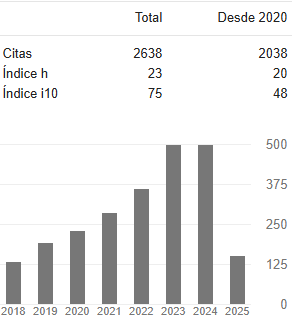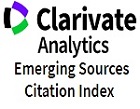Numerical solution of a non-local fractional convection-diffusion equation
DOI:
https://doi.org/10.31908/19098367.2954Keywords:
Finite Differences, Discrete Mollification, Fractional Derivation, Nonlocal EquationAbstract
In this paper we consider a non-local time-fractional convection-diffusion equation. The fractional derivative is defined in the Caputo sense. The numerical solution is developed by an explicit numerical scheme using the finite differences method and discrete mollification for the non-local term. From the numerical scheme and the von Neumann method, the stability condition (CFL) is established. The monotony property, the total variation property (TVD) and some important inequalities in the regularity of the scheme are proved using the stability condition. Finally, some numerical experiments with a source term are presented, which allows finding the analytical solutions to perform the respective calculations of the errors and convergence orders with the numerical approximation.
Downloads
References
Kilbas, A. A., Srivastava, H. M., and Trujillo, J. J., Theory and applications of fractional differential equations, vol. 204. Elsevier, 2006.
Sene, N., (2022), “Analytical solutions of a class of fluids models with the Caputo fractional derivative”, Fractal and Fractional, 6(1), p. 35.
Zafar, Z. U. A., Zaib, S., Hussain, M. T., Tunç, C., and Javeed, S., (2022), “Analysis and numerical simulation of tuberculosis model using different fractional derivatives”, Chaos Solitons Fractals, 160, 112202.
Erturk, V. S., Ahmadkhanlu, A., Kumar, P., and Govindaraj, V., (2022) “Some novel mathematical analysis on a corneal shape model by using Caputo fractional derivative”, Optik (Stuttg), 261, 169086.
Vellappandi, M., Kumar, P., Govindaraj, V., and Albalawi, W., (2022), “An optimal control problem for mosaic disease via Caputo fractional derivative”, Alexandria Engineering Journal, 61(10), pp. 8027–8037.
Acosta, C. D. and Mejía, C. E., “Stable computations by discrete mollification”, 2014.
Abdel-Rehim, E. A., (2016), “Fundamental solutions of the fractional diffusion and the fractional Fokker–Planck equations”, Journal of the Egyptian Mathematical Society, 24(3), pp. 337–347.
Kaplan, M. y Bekir, A., (2016), “A novel analytical method for time-fractional differential equations”, Optik (Stuttg), 127(20), pp. 8209–8214.
Khan, N. A., Khan, N. U., Ara, A., and Jamil, M., (2012), “Approximate analytical solutions of fractional reaction-diffusion equations”, Journal of King Saud University-Science, 24(2), pp. 111–118.
Lenzi, E. K., dos Santos, M. A. F., Lenzi, M. K., Vieira, D. S., and da Silva, L. R., (2016), “Solutions for a fractional diffusion equation: anomalous diffusion and adsorption–desorption processes”, Journal of King Saud University-Science, 28(1), pp. 3–6.
Thabet, H. and Kendre, S, (2018), “Analytical solutions for conformable space-time fractional partial differential equations via fractional differential transform”, Chaos Solitons Fractals, 109, pp. 238–245.
Bayrak, M. A. and Demir, A., (2018), “A new approach for space-time fractional partial differential equations by residual power series method”, Appl Math Comput, 336, pp. 215–230.
Zhang, J., Zhang, X., and Yang, B., (2018), “An approximation scheme for the time fractional convection–diffusion equation”, Appl Math Comput, 335, pp. 305–312.
Bisci, G. M. and Servadei, R., (2015), “A Brezis–Nirenberg splitting approach for nonlocal fractional equations”, Nonlinear Anal Theory Methods Appl, 119, pp. 341–353.
Li, L., Zhou, B., Chen, X., and Wang, Z., (2018), “Convergence and stability of compact finite difference method for nonlinear time fractional reaction–diffusion equations with delay”, Appl Math Comput, 337, pp. 144–152.
Yuste, S. B. and Acedo, L., (2005), “An explicit finite difference method and a new von Neumann-type stability analysis for fractional diffusion equations”, SIAM J Numer Anal, 42(5), pp. 1862–1874.
Agarwal, P. and El-Sayed, A. A., (2018), “Non-standard finite difference and Chebyshev collocation methods for solving fractional diffusion equation”, Physica A: Statistical Mechanics and Its Applications, 500, pp. 40–49.
Takeuchi, Y., Yoshimoto, Y., and Suda, R., (2017), “Second order accuracy finite difference methods for space-fractional partial differential equations”, J Comput Appl Math, 320, pp. 101–119.
Wei, L., (2017), “Analysis of a new finite difference/local discontinuous Galerkin method for the fractional diffusion-wave equation”, Appl Math Comput, 304, pp. 180–189.
Ali, S., Bushnaq, S., Shah, K., and Arif, M., (2017), “Numerical treatment of fractional order Cauchy reaction diffusion equations”, Chaos Solitons Fractals, 103, pp. 578–587.
Salehi, Y., Darvishi, M. T., and Schiesser, W. E., (2018), “Numerical solution of space fractional diffusion equation by the method of lines and splines”, Appl Math Comput, 336, pp. 465–480.
Acosta, C. D. and Osorio, F. C., (2015), “Numerical solution of the non-local Black-Scholes model by means of discrete mollification”, Revista Integración, 33(2), pp. 145–160.
Bhowmik, S. K., (2014), “Fast and efficient numerical methods for an extended Black–Scholes model”, Computers & Mathematics with Applications, 67(3), pp. 636–654.
Acosta, C. D., Amador, P. A., and Mejía, C. E., “Stability analysis of a finite difference scheme for a nonlinear time fractional convection diffusion equation”, in Analysis, Modelling, Optimization, and Numerical Techniques, San Andres Island, ICAMI, Springer, Nov. 2013, 2015, pp. 139–150.
Shen, S., Liu, F., Anh, V., and Turner, I., (2006), “Detailed analysis of a conservative difference approximation for the time fractional diffusion equation”, J Appl Math Comput, 22, pp. 1–19.
Downloads
Published
Issue
Section
License
Copyright (c) 2024 Entre ciencia e ingeniería

This work is licensed under a Creative Commons Attribution-NonCommercial 4.0 International License.



















